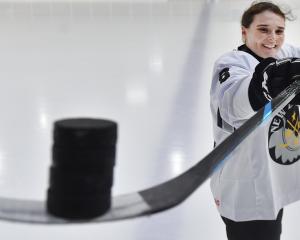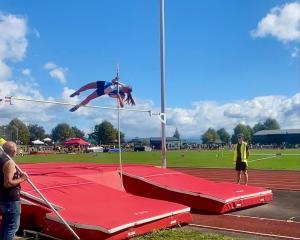He was dedicated and trained hard, initially under the guidance of Duncan Laing and for the last five years with Osca coach Gennadiy Labara.
Progress became slow and had come to a dead stop last year. He contemplated giving up the sport.
''My teeth were going chalky and my muscle growth was halted,'' Glassford said.
''I wanted to get my sinuses sorted out. My nose was constantly running and it was filling my lungs with junk.
''I had very low energy and was always tired. I couldn't do anything and was burning out.''
It was at this stage that his mother, Karen Glassford, intervened and helped her son get his swimming back on track.
Glassford's cousin is international mountain biker Samara Shepherd, who was having similar energy and motivational problems.
Wellington health consultant Gary Moller watched her compete at a mountain bike competition, recognised her problem, and said he could help. Moller's treatment worked for Shepherd and she has been contracted to a professional mountain bike team in Belgium this year.
Moller, the brother of 1992 Olympic marathon bronze medallist Lorraine Moller, explained Glassford's problem.
''Matthew had extreme fatigue,'' Moller said.
''He was like an athlete who had been through several cycles of a washing machine, plus time in the tumble drier. He was washed out.
''He had chronic respiratory tract infection, including sinusitis, and was facing major surgery that would have knocked him out of swimming for a season.
''It would be very difficult for an exhausted athlete to come back from that and regain the lost momentum.''
Moller, who studied at the University of Otago 30 years ago, specialises in hair tissue mineral analysis.
''I used it to identify the underlying causes of Matthew's fatigue and infections and took nutritional countermeasures,'' he said.
''We gave Matthew some high-quality protein in a super smoothie. It included a special form of magnesium, vitamins like pyridoxine (vitamin B6), loads of zinc and large amounts of iodine.
''We tried to balance out that flood of chlorine and fluoride by pumping in lots of iodine, to displace the chlorine, fluoride and bromide.''
Moller described what Glassford was like when he first met him.
''He was very sad. He had lost motivation. His coach was frustrated, and Matthew was struggling.
''He'd been doing an enormous amount training but had nothing to show for it.''
Glassford is a different person today. He is now confident in himself and has regained the spark and inspiration to achieve the swimming goals he dreamed about when he shifted to Dunedin six years ago.
''I feel healthier and stronger,'' Glassford said.
'' I can concentrate on things better. My life feels so much better now.''
Moller has tested many elite swimmers who are close to international status and most of them are affected to a greater or lesser degree by the effects of swimming in chlorinated water.
''It affects thyroid function,'' Moller said.
''A person with poor thyroid function will tend to be very tired, have poor cold tolerance and will tend to put on weight.
''It is something a swimmer needs like a hole in the head. It is highly undesirable to have an underactive thyroid.''
The halogens that are found in swimming pool water (chlorine, fluoride and bromide) are used for getting rid of bugs.
''The swimmers are exposed to large amounts of chlorine, fluoride and bromide that are taken into the body from the lungs and wet skin,'' Moller said.
''The swimmers spend several hours a day in the pool and sometimes work as lifeguards and pool attendants. The chlorine, fluoride and bromide displaces iodine from the thyroid and causes problems.
''The countries that have outdoor pools may have an advantage over New Zealand. When swimmers come to see me, they reek of chlorine. Their entire bodies are soaked in the stuff. It is unhealthy.
''Swimmers who make it to the top do so despite the chemical soup they spend all their time swimming in.''
Matthew Glassford
The facts
Age: 22.
Coaches: Previously Duncan Laing, now Gennadiy Labara.
Best event: Breaststroke.
Record: Bronze medal 200m breaststroke New Zealand open champs (2012); New Zealand representative, Oceania championships, New Caledonia (2012).











